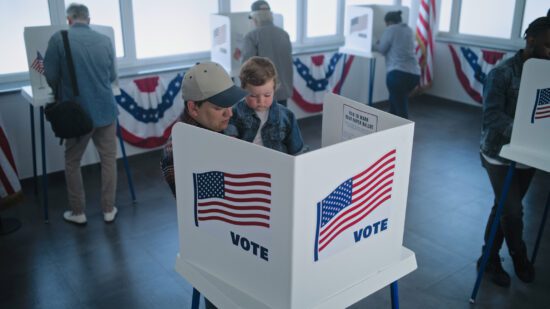In September 2023, a superior court judge in San Bernardino County, California, blocked a school policy requiring parents to be notified if their child asked to go by a different gender identity or pronoun. In language similar to other judges and state officials, Judge Thomas S. Garza expressed concern about how to protect LGBTQ students, with the state’s attorney general referring to the new school policy as “forced outing.”1Romine, Taylor. “California Judge Temporarily Blocks School District Policy Requiring Parents to Be Notified If Their Child Asks to Go by a New Gender Identity.” CNN, September 7, 2023. https://www.cnn.com/2023/09/07/us/california-judge-blocks-school-gender-change-policy-chino-valley/index.html. Similarly, the Linn-Mar Community School District of Iowa created a policy which would have allowed children to create a “Gender Support Plan” with school officials and potentially exclude parents from being notified if the child desired.2Parents Defending Educ. v. Linn Mar Cmty. Sch. Dist., 83 F.4th 658 (8th Cir. 2023). Additionally, staff and students would be required in this case to use the name, gender identity, and pronouns of the student, and failure to do so would result in disciplinary action.
At the heart of these cases are contested and conflicting conceptions of rights: Does a child have the right to adopt a gender identity in conflict with their biological sex? Does a parent have a right to know all the details of their child’s education and social life in school? If those rights come into conflict, whose should take priority? What is the role of the government in these conflicts?
Embedded within the question of rights are deeper questions about the relationship between individuals, families, and wider society: Do parents have rights over and responsibilities to their children? Can children make autonomous decisions without parental oversight?
As Christians, we affirm that each person is made in the image of God and possesses intrinsic worth, dignity, and value. Further, we agree with the principles that Western civilization has recognized philosophically for centuries now: that each individual is endowed with certain inalienable rights, among which are life, liberty, and the pursuit of happiness. However, we deny the modern concept of the person as mere atomistic individuals, independent of social relationships and shared obligations to one another, and the modern notion of autonomy founded on self-defined personhood. We can both affirm that individual rights are pre-political realities rooted in the natural order and that they are not the foundation for licentiousness. Rights entail duties and responsibilities for the common good of both individuals and society.
Further, on the basis of both biblical convictions and our shared Baptist heritage, we affirm the goodness of God’s design for families as “the foundational institution of human society.”3Baptist Faith & Message 2000, “Article XVIII: The Family,” https://bfm.sbc.net/bfm2000/#xviii. The relationship between parent and child, whether biological or legal, is a unique bond in society. There is a dual duty of children to obey parents—so long as parents do not command sin—and of parents to provide and care for their children both physically and spiritually. Parents are to be the primary teachers of “spiritual and moral values” and, by their example and discipline, encourage their children to make choices based on biblical teaching.4BFM2000, “Article XVIII: The Family,” https://bfm.sbc.net/bfm2000/#xviii.
Southern Baptists have spoken consistently of the rights of parents to occupy this central role as the primary educators of their children on matters of gender and sexuality in a variety of ways, including resolutions passed by messengers at annual meetings. Southern Baptists have opposed the actions of governments which have attempted to “bypass parental consent” to employ surgical procedures to deal with gender dysphoria. Instead, they recognize that attempts to do so are a hollowing out of the rights and responsibilities of parents and often are threats to the consciences of those who do not agree with the radical gender ideology of our present cultural moment.5“On Opposing ‘Gender Transitions’ (2023),” https://www.sbc.net/resource-library/resolutions/on-opposing-gender-transitions/.
On the topic of education, Southern Baptists have affirmed the duty of parents to educate their children on matters of importance.“6On the Importance of Christ-centered Education (2014),” https://www.sbc.net/resource-library/resolutions/on-the-importance-of-christ-centered-education/; “On Educating Children (2005),” https://www.sbc.net/resource-library/resolutions/on-educating-children/. In a 1980 “Resolution on Children’s Rights,” Southern Baptists recognized that “to give children all adult rights would burden their immature and inexperienced minds with the responsibility of forming judgments and making far-reaching decisions which are difficult for even the most mature adults.”7“On Children’s Rights (1980),” https://www.sbc.net/resource-library/resolutions/resolution-on-childrens-rights/. As these resolutions affirm, parents have the duty to care for and educate their children. It would be a dangerous mistake to give to children a right for which they lack the maturity to carry out the obligations associated with the right.
In the judicial and legislative realm, through their public policy arm (the Ethics & Religious Liberty Commission), Southern Baptists have defended the rights of parents to be the primary educators of their children. The ERLC has worked with the state conventions of Iowa and Wisconsin-Michigan in opposing school policies and legislation that would limit parents’ right to instruct their children in God’s good design for gender and sexuality or that would insert government actors between parents and children.8ERLC, “ERLC joins in supporting parental rights and opposing radical gender ideology in schools,” ERLC.com, June 2, 2023, https://erlc.com/resource-library/articles/erlc-joins-in-supporting-parental-rights-and-opposing-radical-gender-ideology-in-schools/. Fundamentally, the right of parents to educate their children carries with it the right to decide what kind of instruction is best for their child. Procedurally, when schools enact policies designed to withhold information from parents about instruction, they infringe upon the rights of parents to make informed choices about their child’s education. Further, any judgment by school officials that parents are insufficiently supportive of their child, without due process or notification, creates a system whereby parents have no way to defend themselves against accusations of abuse, neglect, or harm other than seeking legal action. Both factors are an overstep of the government’s proper role in punishing evil and promoting the good, and a denial of a system of laws and justice.
In the context of the current debates about gender, sexuality, and contested rights, this white paper provides a biblical, theological, and philosophical foundation for parental rights. It recognizes the primacy of the family unit as a pre-political unit of society and parents as the primary educators of their children. On the basis of that foundation, it offers guiding principles for policy and legislations relating to the relationship between parents, children, and government actors.
Biblical and Theological Exegesis
The purpose of this section is to provide a biblical theology of parental rights and responsibilities. The following sections ground the claim that the family is a pre-political unit with rights and responsibilities that precede the state. Our explanation follows the Baptist Faith and Message 2000 (BFM2000) section XVIII which says: “God has ordained the family as the foundational institution of human society.” First, we provide a general summary of our overall framework for understanding the family in the context of contemporary terminology such as “rights” and “responsibilities.” The two subsequent sections provide the biblical and theological “grounding” for this contemporary terminology and framework. Second, we provide theological exegesis as a means of explaining the Scriptural witness to parental rights. Third, we provide a constructive theological account of parental rights and responsibilities. Our work is not exhaustive and is sourced especially from Scripture. Therefore, ancillary debates and legal quandaries are left for other sections, whereas our aim is that this theological account can serve as a resource or foundation for other questions.
I. The Framework
The family functions as a (if not the) foundational social unit within society. As the BFM 2000 states: “God has ordained the family as the foundational institution of human society.”9BFM2000, “Article XVIII: The Family,” https://bfm.sbc.net/bfm2000/#xviii. From a theological vantage point, we also understand the family to fulfill this role in the overall economy of God in history. As a social unit, the family, like other institutions, has both “rights” and “responsibilities.”10For biblical examples, see the next section. Texts like Ephesians 6:1-4 are clear that parents and children both have differing layers of accountability.Every relationship, especially the family relationship, naturally gives rise to special benefits and duties. These relationships of accountability and privilege are variously described as “rights” and “responsibilities” or “duties.” We could distinguish these by saying that rights are positive privileges or goods whereas responsibilities are negative obligations.11John Mitchell Finnis, Natural Law and Natural Rights, 2nd edition (Oxford, UK: Oxford University Press, 2011), 203–4; Nicholas Wolterstorff, Justice: Rights and Wrongs (Princeton, NJ: Princeton University Press, 2008), 135. Rights are owed or given, and responsibilities are obligated. But each are two sides of the one coin of accountability that arises from relationships. As the Declaration of Independence acknowledges, we are given “certain unalienable rights” which include “life, liberty, and the pursuit of happiness.” The idea of rights, then, is hardwired into many of our lexicons, but it is also true that rights “belong to the furniture of the moral universe.” They are not dreamt up or schemed up by any overly zealous political group.12Wolterstorff, Justice, 135.
More specifically, in much of the legal literature, rights are defined as legitimate claims and entitlements, especially as they relate to moral claims and entitlements. Responsibilities specify what others rightly expect from me, while rights specify what I rightly expect from others.13Jordan Steffaniak, “The Ordered Animal: Accountability, Teleology, and Human Nature,” Southeastern Theological Review 13, no. 1 (Spring 2022): 96. There are further aspects to both rights and responsibilities, such as the distinction between a “permission” right and “claim” right, which is intended to explain the positive and negative scope of rights. Permission rights are rights to a negative good (e.g., a right to non-interference from someone, like the right to not be murdered) and claim rights are rights to a positive good that is actively supplied by another (e.g., the right of a child to have a shelter, food, and protection, etc. which is supplied by their parents).14Brendan Case, The Accountable Animal: Justice, Justification, and Judgment (New York, NY: Bloomsbury Academic, 2021), 14. Of course, it should be noted that while some goods are supplied by others, this doesn’t make them a right. While this may make us accustomed to certain goods, they needn’t be considered rights. There is a further distinction between social and natural rights, both of which can be moral.15Case, The Accountable Animal, 15. Some rights are socially mediated (e.g., politically legislated rights such as the right of a U.S. citizen to receive a tax credit for each dependent child) while others are natural pre-political entitlements (e.g., those enshrined in the Declaration of Independence to life, liberty, and the pursuit of happiness).16Case, The Accountable Animal, 19.
From a Christian perspective, the family has a distinctive set of rights and responsibilities. We understand that as a pre-political institution (i.e. the family is fundamentally natural, not the product of social engineering or political legislation) family members have rights and responsibilities prior to and independent of other institutions such as the state. The state, herein defined, is the most extensive temporal society in a region, and it serves the community by which it is constituted to achieve goals that individuals and/or pre-political groups cannot.17Herman Bavinck, The Christian Family, trans. Nelson D. Kloosterman (Grand Rapids, MI: Christian’s Library Press, 2012), 110–11. It fulfills basic duties such as protection from enemies, coordination of various large-scale goods, resolution of disputes, etc. The state is not more fundamental than other pre-political institutions such as the family, and is not competent to judge matters outside its own authority. Therefore, the state should not interfere with those more fundamental rights or responsibilities, except in cases of the extreme abdication of responsibilities necessary for the life and health of the family.18Patrick Lee, “Who Has Primary Responsibility for Rearing and Educating Children?,” in Parental Rights in Peril, ed. Stephen M. Krason (Steubenville, OH: Franciscan University Press, 2022), 13. The state’s God-ordained raison-d’etre is in service to pre-political institutions, especially the family, upon which it relies. Thus, political authority, especially state authority, is about righting wrongs and promoting the good, not simply about rights and responsibilities.19Oliver O’Donovan, Resurrection and Moral Order: An Outline for Evangelical Ethics, 2nd Edition (Grand Rapids, MI: Eerdmans, 1994), 128. It should be narrowly focused on the public good, or what Patrick Lee has described as “only what can be more effectively and appropriately pursued by the state.” Therefore, it sets “the conditions for people and pre-political communities to facilitate their own realization of the various intrinsic goods.”20Lee, “Who Has Primary Responsibility for Rearing and Educating Children?,” 9–10.
In natural circumstances, within the family unit, a husband and wife enjoy the good of the marital union that produces children, and they have responsibility for the guidance, provision, and protection of their children. Children are given the right to these goods and the responsibility to follow their parents’ instructions for their good.21Lee, “Who Has Primary Responsibility for Rearing and Educating Children?,” 2. The reason parents have this right and responsibility over their children, and not others, is because of the nature of the family. The parents’ union produces a child with their DNA. Therefore, the child’s fundamental and unique “blueprint” for the active self-development is from their biological parents and none other. Because of this, the child’s identity is bound up with their connection to their biological father and mother. As such, their personal identity is in part constituted by their biological parents. Therefore, children have a right to their own biological parents, and parents have both the right and responsibility to legal custody and the obligations that come from having children.22Lee, “Who Has Primary Responsibility for Rearing and Educating Children?,” 6. Parents are obliged to nurture, love, direct, and educate their children. By doing so they create a “home” for children whereby they develop their own sense of agency and are protected from exploitation by others. Through these families, children and parents are given space for intimacy and love which constitute children’s biographies.23Luke Bretherton, A Primer in Christian Ethics: Christ and the Struggle to Live Well (Cambridge, UK: Cambridge University Press, 2023), 267. In non-biological circumstances, these homes are constituted by members not biologically related to one another, either through adoption, orphaning, or other means. Yet, the essential characteristics and structure of a family and the home remain the same. Again, as the BFM2000 states, the family is a more generic term beyond biology and “is composed of persons related to one another by marriage, blood, or adoption.”
These beliefs have been shown to be natural and universal but in what follows we will also show that they are grounded in Scripture. In the United States, they are further grounded in legal claims and precedent. For example, in Pierce v. Society of Sisters (1925), the court stated that “the child is not the mere creature of the State; those who nurture him and direct his destiny have the right, coupled with the high duty, to recognize and prepare him for additional obligations.”24Cited in Michael P. Donnelly, “A Legal Overview and History of Parental Rights in the United States,” in Parental Rights in Peril, ed. Stephen M. Krason (Steubenville, OH: Franciscan University Press, 2022), 15. This judgment, in few words, explicates the concept of rights and responsibilities that are uniquely familial and not the possession of other political entities. The state’s role is to cultivate the conditions necessary for the common good of children and families.25Bretherton, A Primer in Christian Ethics, 269.
II. Biblical Exegesis
Holy Scripture repeatedly bears witness to the importance of parents and the responsibility they have for raising their children in the training and instruction of the Lord (Deut. 6:4-9; Prov. 22:6; Eph. 6:4). It is good for children to be instructed this way because it leads to their flourishing in accord with the Creator’s design for his world, including human beings. While this instruction is good for all people, there is a special place and role for the nuclear family within the economy of creation. Parents bear both the rights and responsibilities for their biological children, those legally assigned to them through such means as foster care or adoption, and children from extended families or communities for whom an adult may be given guardianship. Such rights and responsibilities of an adult or parent do not extend to all children, but only to those rightly under their guardianship. The Scriptural vision for the care and formation of children begins with the biological family assisted by the Christian community of the Church, in the context of a state offering its proper provisions and protections as befits its time and place.
Scripture teaches that God places children in families and gives parents the responsibility to teach and train them in the ways of the Lord. From the formation of the first family, Adam and Eve are given children as they begin to multiply and fill the earth. (Gen. 1-2) The expectation throughout the Scriptures is that parents would instruct their children in the ways of the Lord as part of their role in being fruitful, multiplying, filling the earth, subduing, and ruling over it. (Gen. 8-9; Deut. 6; Eph. 5) This is an act of religious devotion for the parents to teach the ways of the Lord to their children, a right and responsibility given to parents by God for the good of the world.
In due course, God’s law is given to instruct the nation of Israel, all of God’s people including the children. In Deuteronomy 6, Moses makes it clear that parents are the ones responsible to teach their children the law of the Lord. They were to teach them as they walked, as they went to bed, as they went about every part of their day. This command was given by God to his people so that they would not turn from him. This was a fundamental part of their religious expression and God’s law not only accounts for the parent-child relationship and responsibility, it assumes it and prescribes high expectations for parental oversight.
Joshua 1 shows us that considering and following God’s law was how the people would flourish. Parents teaching the law to their children led to the flourishing of their children, their family, as well as their nation. In Joshua 24:14-15, families face a choice: worship the God of Israel or worship the gods of the people around them. Joshua’s choice that his family will serve the God of Israel models the parents’ role in making religious decisions for their family. Not only is it a religious duty for God’s people, connected to parents’ belief about how children will thrive and be blessed, in this moral ecology, withholding such instruction would be a harm for the children.
Many of the Proverbs, especially chapters 1-8, are an example of parents teaching their children. The author says, “Listen, my son, to your father’s instruction, and don’t reject your mother’s teaching, for they will be a garland of favor on your head and pendants around your neck.” (Prov. 1:8-9) The teaching that parents give to their children is a gift to them; God’s law leads to their flourishing. The way of true life, liberty, and happiness is found in the way of the Lord. The example of the writer of Proverbs is to teach clearly what is true and what is right and the way that is best for our children.
These passages help us to see that it is a matter of religious expression for parents to teach their children the instructions that God has given to his people. It is the parents’ responsibility before God to instruct their children, and it is an act of worship before God. Therefore, as children are given to parents by God, it follows, and Scripture bears witness, that parents are given the right and responsibility for the care and formation of children. Thus, the role of the state toward families is ministerial and supportive in nature.
The New Testament continues with many of the same themes. Paul says that Timothy learns the Scriptures from his mother and grandmother (2 Tim. 1:5). Children are to obey their parents in the Lord, and parents are to train their children in the Lord (Eph. 6:1-4). For the Christian, it is a matter of religious devotion to be able to teach and train their children in the ways of God.
The New Testament includes, as part of the larger general moral teaching applicable to all people, specific instruction to parents concerning their children. There are general instructions given to God’s people, the church. The church is described as the family of God, and we are told to care for and disciple one another. The church is to nurture young Christians into mature disciples, much like parents do for their children.
But this familial language does not mean that the church should replace the nuclear family or take on the parental responsibility for teaching their children. In fact, 1 Timothy 5, in the middle of instructions for widows, includes verse 8, “But if anyone does not provide for his own family, especially for his own household, he has denied the faith and is worse than an unbeliever.” This gives us an understanding of the way that the nuclear family is to function within the household of God. Biology is not destroyed by the church. Grace does not destroy nature.
According to 1 Timothy 5, widows were to be cared for and provided for by the church only if they met certain conditions. While some conditions were about their character and service to the church, some were about the biological family—children and grandchildren—that could support them. If they have children or grandchildren, they are to take care of the widow. This is when Paul says that we are to provide first for our own household and family, showing that there is a special responsibility that the nuclear family has within the household of faith.
Ephesians 6:1-4 includes instructions to parents and children similar to those in the Old Testament. Children are to obey their parents in the Lord and are reminded of the command to honor their mother and father. Fathers are not to stir up anger in their children but are to “bring them up in the training and instruction of the Lord.” This shows the responsibility for both the parent to teach and the children to follow the instructions that God has given.
Within the church, God has given special responsibility to the nuclear family. Parents are to teach and instruct their children in the ways of God. These instructions are for their flourishing. Scripture offers examples of wise ways to instruct children and warns against stirring up anger in them. The Scriptures press upon parents the responsibility that they have for fulfilling their role in a way that honors the Lord. This means that it is a religious act of worship and a matter of religious freedom for parents to be able to teach the things of God to their children.
III. Theological Construction
Further, to the importance of family in Scripture, the dominant metaphor used to describe God’s people throughout the Bible is that of family. The New Testament is particularly laden with imagery of God as Father, Christ as Son, as well as Christ the brother and bridegroom of the Church, the very bride of Christ, himself. Moreover, followers of Christ are recognized as brothers and sisters in the faith and members of one body. Historically, Christians have also included the notion of the Church as Mother, leaning further into the family imagery given by Scripture. As professor Joseph Atkinson rightly observes:
Thus, history can be understood as sacred familial history—the intersection between the human and the divine. The individual cannot exist without the familial context. Thus, the family emerges as the instrument God has created by which His primary blessing in creation is realized. It is the instrument through which creation will reach its final goal. For Israel, the family is assumed into the divine will.Joseph C. Atkinson, Biblical & Theological Foundations of The Family (Washington, DC: Catholic University of America Press, 2014), 71-72.
Suffice it to say that family—both biologically and metaphorically—is near to the heart of God and central to his intentions for the world. God’s original mandate is given through the structure of family. Through the head of the family, the world was infected with sin. Through the seed of the first woman, God promised that one would come who would defeat death and sin. Through Noah’s family, God preserved the human race. Through Abraham’s family, God promised to bless the nations. Through David’s family, One will come who will sit on David’s eternal throne. Through Mary, the virgin, a Son was given, a second Adam who restores our way to the Father. And through new birth by the Spirit, individuals are adopted into the family of God.
Family is fundamental to the Christian story and to proper Christian living in the world. To neglect its centrality is to abdicate a basic cultural responsibility, and to undermine its integrity is to compromise the Creator’s plan for creation. Hence the depth and sincerity of the Christian commitment to proper rights and responsibilities of the family, especially concerning the nurture and care of children.
In the New Testament era, the role of the biological family remains that of the basic societal building block, as well as the dominant analogy for the people of God, the Church. Culturally, the family remains grounded in the creational order as a pre-political institution that participates in larger societal units and is meant to enjoy the proper protections and provisions of the state. The state is not permitted to interfere with the family unit’s rights and responsibilities, especially regarding the moral, spiritual, physical, and intellectual formation of children. Rather, the state assumes a God-ordained role alongside families for proper provisions and protections in accord with just law and constitution.
Concerning civil participation, from the Christian perspective, families are obliged to take full advantage of their citizenship in exercising all rights of voting and representation at local, state, and national levels. The call of the Christian individually, as well as of families, is to pray for government officials and to live lives worthy of the Kingdom of God as a blessing both to God and neighbor. As such, faithful participation in communal and civil structures is part of our neighborly duty, offering opportunities to advocate for virtue and advance the way of Christ in all areas of society and culture.
Concerning household family affairs, from a Christian perspective, parents and/or guardians are responsible to provide for the physical, spiritual, and emotional needs of the household, to promote virtue within the home toward the flourishing of all persons therein according to God’s design, and to cultivate an environment of love, care, and formation toward mature men and women.
Ultimately, individual Christians and families, though intentional and active in communal, state, and national affairs, hope not in the city of man but in the city of God wherein lies our first and highest allegiance. Where the opportunity to vote, voice, and advocate toward that which is good, true, beautiful, and just is offered, we must decide to take up these causes. And, where goodness, truth, beauty, and justice are maligned, we raise our voices in civil concern and opposition, while also lifting our souls in prayer to God on behalf of our country, for the sake of our neighbors, and for the restoration of the world.
With respect to the threat of state or federal interference on parental rights and responsibilities, Christians thus stand opposed to such interference firstly on the authority of Scripture and God’s design and intention for the family; secondly on the grounds of United States precedent and tradition concerning parental rights and responsibilities; 26Michael P. Donnelly, “A Legal Overview and History of Parental Rights in the United States,” Parental Rights in Rights, ed. Stephen M. Krason (Steubenville, OH: Franciscan University Press, 2022). and thirdly in response to evidence wherein governmental disruption of the family unit, especially of parental rights and responsibilities, proved detrimental to the good of the country and its citizens.
Policy Principles
I. Parents are the primary educators of their children in matters of moral training and preparation for future obligations.
The role of the parent as the primary educator of the children in matters of moral training is rooted in the unique biological and legal relationship between parent and child. Because of this inextricable bond, children are part of their families directly, whereas their participation in the larger political community is indirect, often mediated through their parents. Thus, while both parents and the state have duties to children, the responsibilities are not equal in authority. The primacy of the parental authority is a God-given reality modeled in the closeness of the relationship between parent and child.27Melissa Moschella, To Whom Do Children Belong? Parental Rights, Civic Education, and Children’s Autonomy (Cambridge, UK: Cambridge University Press, 2017), 5.
The government oversteps its authority when it intervenes between parent and child to usurp an area of moral instruction that rightly lies within the parents’ authority and responsibility. While the state should take care to ensure that each child receives adequate education and is prepared for participation in the larger body politic as an engaged citizen, it errs when it contravenes moral instruction by parents or when it seeks to block or remove parents from the education process because of their beliefs.28Melissa Moschella, “California ‘Transgender Refuge’ Bill Usurps Parental Rights and Endangers Children,” Public Discourse, September 20, 2022, https://www.thepublicdiscourse.com/2022/09/84645/. By doing so, the state effectively prevents parents from carrying out their moral duty to instruct their children, an action that is itself unjust. The state’s role is primarily to prevent evil against citizens and promote the common good, not in moral instruction, a role properly reserved for families and the church.
Recognizing the difference in the authority of the parents over children as opposed to the state, parents are to properly execute the attending duty to “teach their children spiritual and moral values and lead them … to make choices based on biblical truth.”29BFM2000, “Article XVIII. The Family,” https://bfm.sbc.net/bfm2000/#xviii. The obligation to train children up for moral training is a guardrail on parental negligence or misapplication. The duty of parental authority is not the right to teach children whatever they desire. Rather, it is normed by what is good, true, and righteous. Thus, parents are accountable for what they teach their children and bear moral culpability when they do so wrongly.
One final aspect of the parent’s role in educating children bears mentioning. The role of the parent to teach and instruct is preparatory in nature. The task of parents should culminate in children who are capable of wise living. As the U.S. Supreme Court made clear in Pierce v. Society of Sisters (1925), “The child is not the mere creature of the State; those who nurture him and direct his destiny have the right, coupled with the high duty, to recognize and prepare him for additional obligations.” 30Pierce v. Society of Sisters, 268 U.S. 510 (1925) Thus, as children mature they should (ideally) become more able to discern the good and care for themselves and others. This does not mean that there are times when parents should be excluded from the education process by the state. Rather, it is a recognition that upon maturity, children should be able to make their own decisions rightly and that parents do not bear the same level of moral culpability as when they were minors. This accords both with a biblical worldview and with U.S. age accountability standards.
II. The primary responsibility of the wellbeing of children lies with parents, not the state.
Because the family is a pre-political entity rooted in the created order, there are special rights and responsibilities that exist within it for its members. There exists a unique relationship between parent and child based in biology.31This is not to deny or delegitimize the parental relationship in non-biological situations, as in the case of adoption or blended families, where the relationship is legal rather than biological. However, it is to recognize that these legal relationships arise out of the breaking of a previous biological relationship. These other relationships are not lesser in their obligation to the child but are legal attempts to respond to broken biological and familial relationships. This principle flows from the material reality that children do not arise ex nihilo but are connected to those who came before them. Though contemporary society is prone to treat atomized individuals as the fundamental unit of civilization, this is contrary to what we know to be true given the dependent nature of humanity in God’s good design. Familial connection is grounded in the material nature of our identity. We are to “know ourselves as embodied creatures who occupy a fixed place in the generations of humankind.”32Gilbert Meilaender, Bioethics: A Primer for Christians, Fourth edition (Grand Rapids, MI: William B. Eerdmans Publishing Company, 2020), 15.
Where it affects children, legislation and policy will recognize the special familial bond between parent and child. When policymakers begin with the assumption that they know what is best for children, not parents and families, it weakens the familial bond and encourages other institutions to assume a responsibility that those institutions do not possess and are ill-equipped to carry out. An error in the other direction is treating children as autonomous individuals mature enough to assume all the freedoms, responsibilities, and duties of adults. Both of these errors neglect the reality that children are under the properly ordered authority of parents, who have responsibility for training them toward righteousness and maturity.
The state as an institution maintains certain horizons of responsibility, namely punishing evil and commending the good (Rom. 13:3-4; 1 Pet. 2:14). However, this responsibility carries with it the implicit acknowledgement that there are areas in which the state is competent to judge (i..e the breaking out of violence against its citizens) and areas where it is not (i.e. religious doctrine). The church as an institution is to be free from state interference because “a free church in a free state is the Christian ideal.” 33BFM2000, “Article XVII. Religious Liberty,” https://bfm.sbc.net/bfm2000/#xvii. Similarly, the family is to be free from the interventions of the state in matters which fall under its authority. This is because the family is the “foundational institution of human society.”34BFM2000, “Article XVIII. The Family,” https://bfm.sbc.net/bfm2000/#xviii. The teaching of biblical truths regarding gender and sexuality lies first with parental authority, not state authority.
III. The state should protect the right of parents to raise their children in accordance with their religious convictions.
The right of parents to raise their children in accordance with their sincerely held religious beliefs is a negative right. As a negative right, it entails the ability to carry out action free from the interference of others. When the state interposes itself between parent and child in matters of education that especially concern moral formation, it denies parents the ability to fulfill their moral obligation, namely the teaching of children their values.35Brief for Jewish Coalition for Religious Liberty et al. as Amicus Curiae, Petition for Writ of Certiorari at Supreme Court of the United States, John and Jane Parents 1 and John Parents 2 v. Montgomery County Board of Education, et al., No. 23-601 (January 4, 2024).
Religious freedom is not an unlimited right. However, legal precedent and legislation such as the Religious Freedom Restoration Act require strict scrutiny for any law or policy which would burden religious freedom. For example, a religious belief leading to action that causes long-term or irreversible bodily harm to another individual (i.e. a belief in the requirement of child sacrifice) would be grounds for state intervention and limiting of that action. This would fall under the state’s authority to prevent violence against its citizens. However, a religious belief in the necessity of partaking in wine for first communion prior to the individual being twenty-one years of age would not rise to the level of government intervention. Though there are instances where the state may intervene, these do not extend to the teaching of religious doctrines.
As stated previously, the work of the state is primarily an obligation to promote the good and punish evil (1 Pet. 2:13-14). The “good” is not defined by arbitrary or subjective moral claims, but basic moral goods rooted in the character of God. Among these are the protection of life, the primacy of the family as the social unit of society, the intrinsic dignity and worth of individuals, and the right to worship free from government interference.36John Finnis, Natural Law and Natural Rights, 2nd ed. (Oxford, UK: Oxford University Press, 2011), 85-90. Legislation and public policy help to shape the moral imaginations of citizens and create a shared vision of the social good which also shapes individual decisions.37Robert P. George, Making Men Moral: Civil Liberties and Public Morality (Oxford, UK: Clarendon Press, 2002). When the state ensures the protection of these rights, it sets the necessary conditions or horizons for human and societal flourishing. A state which enshrines principles contradicting such basic moral goods undermines flourishing. Additionally, it fails in its obligation to promote the good.
The state’s work to protect the right of parents to educate in accordance with their religious beliefs should not be construed as an establishment of religion. The topics of sexuality and gender are knowable apart from a particular religious framework. Thus, the state’s efforts to secure this right are not a violation of First Amendment jurisprudence, but a recognition of the creational principles that ground all appeals to rights.
IV. The state’s authority is limited to its God-ordained role of promoting the good and punishing evil.
The state as an institution is primarily concerned with the restraint of violence and the promotion of the good (1 Pet. 2:13-14). The government does not possess unlimited authority to intervene in other institutions. Where the state intervenes, it should do so narrowly for the purpose of promoting justice (i.e., rightly ordered relationships) among its citizens. Properly understood, justice is not merely a legal or constitutional reality, but rather flows from principles rooted in God’s character, discernible in part from nature, and further expounded in special revelation. The state’s intervention is for the purpose of promoting rightly ordered society. Therefore, the state should never act in such a way that it undermines creation-order issues: human dignity, the structure of the natural family, and free exercise of faith.38Andrew Walker, The Nations Belong to God: A Guide to Christian Civic Engagement (Nashville, TN: Leland House Press, 2024), 87.
Baptists have historically recognized that the government has no authority in religious matters, have supported free exercise, and have been staunch defenders of religious liberty. While we recognize that religious liberty is not an unlimited right (i.e. there is no right to perform child sacrifice), we do insist that the state must have a clear and pressing interest before it intervenes.
Like the relationship between the government and the church, the government does not have an unlimited right to intervene in the relationship of the family, especially between parents and children. The government, as one political theologian has argued, “has authority only on those areas God has assigned to it.”39Walker, The Nations Belong to God, 43. Drawing on scriptural teaching, Baptists have affirmed that “parents are to teach their children spiritual and moral values.”40BFM2000, “The Family.”
Legal precedent has reflected the truth that the parents’ rights to teach and train their children for “additional obligations” include moral standards and religious beliefs.41Wisconsin v. Yoder, 406 US 205, 233 (1972). This does not create an arbitrary exemption for religious parents, but rather recognizes that though boards of education have important functions and discretion within their appropriate authority, these must all be properly performed under the First Amendment and Free Exercise jurisprudence.42West Virginia Bd. of Educ. v. Barnette, 319 U.S. 624, 637 (1943)
V. The state may intervene in those instances where parents have neglected a duty to properly care for their children.
Part of the state’s proper authority is the protection of its citizens from violence. Thus, it is entirely appropriate, as part of its duty to ensure the safety of citizens, for the state to intervene when violence has broken out in the civil sphere and punish the guilty. In the case of the most vulnerable citizens who are especially at risk of harm—children, the aged, or infirm—the state acts correctly to prevent and punish harm.
The rights of parents to shepherd and discipline their children are not unlimited. Thus, the right to discipline is not a right to abuse. Policies should reflect the principle that the right of parents encompasses the obligation to care for children under the parent’s charge. In cases of physical abuse, sexual abuse, or abandonment, it is within the proper purview of the state to intervene to protect the life and well-being of the child.
However, the responsibility to protect from violence is not an arbitrary license to intervene in matters of difference. Where cultural beliefs and religious doctrine conflict, the state has no right to intervene. Similarly, the potential for theoretical harm (i.e., the belief that a parent’s religious convictions would be harmful for a child) are not grounds for the state to interject itself between parent and child.43Against the claim that withholding medical intervention for gender dysphoria would constitute harm to the child, there is a growing body of literature which questions the efficacy of procedures such as hormone therapy, puberty blockers, or surgical interventions. See William Malone et al., “Puberty Blockers for Gender Dysphoria: The Science Is Far from Settled,” The Lancet Child & Adolescent Health 5, no. 9 (September 2021): e33–34, https://doi.org/10.1016/S2352-4642(21)00235-2; Lieke Josephina Jeanne Johanna Vrouenraets et al., “Early Medical Treatment of Children and Adolescents With Gender Dysphoria: An Empirical Ethical Study,” Journal of Adolescent Health 57, no. 4 (October 2015): 367–73, https://doi.org/10.1016/j.jadohealth.2015.04.004; Rebecca M. Harris et al., “Decision Making and the Long-Term Impact of Puberty Blockade in Transgender Children,” The American Journal of Bioethics 19, no. 2 (February 2019): 67–69, https://doi.org/10.1080/15265161.2018.1557284. Additionally, many groups which at first touted the procedures have withdrawn their support in light of evidence that it is harmful to children. See, Andrew Gregory, “NHS to Close Tavistock Gender Identity Clinic for Children,” The Guardian, July 28, 2022, https://www.theguardian.com/society/2022/jul/28/nhs-closing-down-london-gender-identity-clinic-for-children; “Sweden’s Karolinska Ends All Use of Puberty Blockers and Cross-Sex Hormones for Minors Outside of Clinical Studies,” https://segm.org/Sweden_ends_use_of_Dutch_protocol; “One Year Since Finland Broke with WPATH ‘Standards of Care,’” https://segm.org/Finland_deviates_from_WPATH_prioritizing_psychotherapy_no_surgery_for_minors; “Medicine and Gender Transidentity in Children and Adolescents – Académie Nationale de Médecine | Une Institution Dans Son Temps,” https://www.academie-medecine.fr/la-medecine-face-a-la-transidentite-de-genre-chez-les-enfants-et-les-adolescents/?lang=en. The state has no right to adjudicate the legitimacy of religious convictions.
Even where the state intervenes, it does not have the authority to do so in secret or without parental notification. Attempts to withhold information and deliberately mislead parents are a violation of the state’s proper authority and ethical operation as well as the parents’ right to notification. If the state suspects that abuse has occurred, then they should make official reports to the appropriate authorities and allow parents to avail themselves of due process. Various court cases have affirmed the right of parents to make decisions regarding custody of their children including the protection that the state must by a “clear and convincing evidence standard” prove parents unfit in a court of law if they are to deny custody rights.44Stanley v. Illinois, 405 U.S. 645 (1972); Santosky v. Kramer, 455 U.S. 745 (1982).
VI. Children are to be viewed as a gift from God to be nurtured well, not as products to be treated with ultimate authority by either the state or parents.
Because children are a gift from God, rather than the product of human desire, design, and initiative, parents are accountable to God for how they nurture and care for their children. On a basic level, this accords with the principle that the primary responsibility to care for children lies with parents, the same basis for their authority over their children. At a deeper level, it recognizes the theological truth that parents exercise their authority within a sphere that is limited by God, just as the state exercises its authority in a limited arena. Within their respective areas of responsibility, both parents and state are accountable to God for how they execute justice and fulfill their obligations.
Further, this view recognizes that there are rights which children possess that parents and the state should respect. For example, the child possesses from conception a right to life that should be respected by the state and parents. Additionally, they possess increasing levels of responsibility as they mature. However, that responsibility and independence is limited, for parents also possess the authority to set boundaries and discipline. Parents perform their duty to their children well when they adequately prepare them to assume at each stage the proper level of independence with the goal that children would be able to care for themselves and others upon adulthood.











